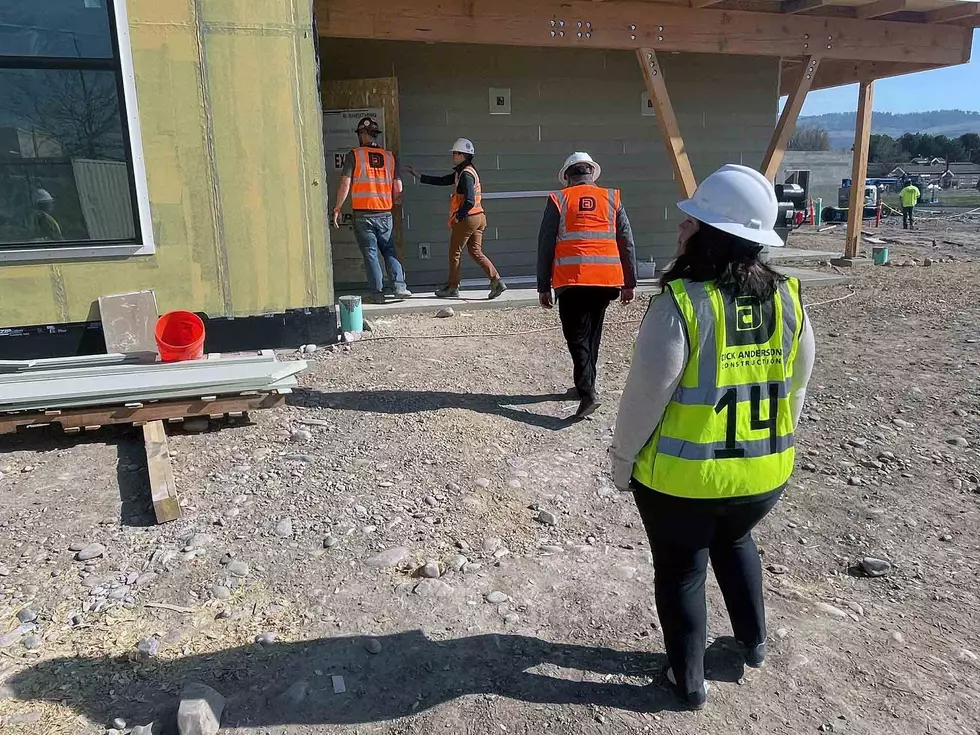
Missoula’s first end-of-life center taking shape amid fundraising
Martin Kidston
(Missoula Current) What's now a construction site in a busy commercial district will undergo a transformation over the coming months, evolving from a bare patch of weeds to a serene garden with private rooms where patients and family can stay during end-of-life events.
Missoula's first dedicated hospice center broke ground last June and is well on its way to opening early next year. The 15,000 square-foot facility has been planned down to the finest detail, from the play of lighting and sound in each room to a reflection center, with end-of-life literature and bereavement support for families.
“This center is designed for those that have a terminal diagnosis and are no longer accepting treatment,” said Amanda Yeoman Melro. “It will provide 24-hour care. When patients are in the home, they do get continuous care, but a lot of that comes from the family members. This center will allow patients to come and families to come to support them.”
Melro, who serves as the executive director of Partners Hope Foundation, said the project has been planned and discussed for years. Missoula, the region's largest population center, lacks a dedicated hospice center and a strong support network that's close at hand.
Melro also noted that Missoula County's population is growing - and growing older. It records around 930 annual deaths with 530 of them being people 75 years or older. An estimated 40% of that demographic lives alone.
“Missoula has one of the fastest aging and oldest populations in the country. Not only that, we have a vast expanse of area to cover,” said Melro. “People live in rural areas and they also live alone. Having a place like this where a family knows they'll be well-taken care of is a huge asset for them. We expect there will be a large demand for the beds.”
On a warm spring morning with construction activity high, Melro and board member Dan Dixson, who also serves as a chaplain, toured the facility's progress. The L-shaped building sits on several acres donated by the Payne family – the same family that donated the land for the new downtown library.
Adjacent to the property sits another several acres, though it's currently vacant. Eventually, it will house the All Nation's Health Center. The two properties will blend together around a large garden designed for peace and reflection, along with a number of spiritual options suited to one's beliefs.
“Our goal for the center is to have indoor and outdoor spaces that are conducive to families and the patients,” said Melro. “We're really focused on native plants and garden areas with pathways and walk through. It's a space where people can really come in and reflect.”
While the landscaping will be added at a later time, each of the center's 12 patient rooms look over the future garden. The doors to each room are wide enough that a bed can be moved to a private patio if the patient desires.
The rooms are also designed for family stays. While they include the necessary equipment for end-of-life care, the medical side is neatly hidden, though the nurses aren't ever far. The facility's design has considered the dying experience for both the patient and the family.
“When it comes to different populations, they have different beliefs on where the beds should be located, along with that functional furniture for families and guests,” said Melro. “All our spaces have been designed to be customized for whatever that experience is.”
While nearly 60% of the deaths in Missoula County occur among those 75 years and older, a large number of deaths still occur within the younger population. But even there the center has a role to play, and it's open to patients and families of any age.
“There will be pediatric beds available,” said Dixson. “As a hospice chaplain, I've dealt with teenagers that are dying, children, even infants. Those families can come here and take advantage of this space. It's any age. This offers caregiving on a very special level and education around end-of-life and death.”
The Partners Hope Foundation was founded in 2017 by a group of community members concerned over Missoula's lack of an end-of-life center. The group consisted of medical, business and nonprofit professionals who saw the need for both care and education around death.
The land donation by the Payne family gave the project a significant boost and the organization's fundraising effort went into high gear. The $15.4 million project is funded 100% by philanthropy and has reached 89% of its goal.
But it still has $1.7 million left before it achieves that goal. Melro said donations and volunteer support will be key to the project's success. The organization hopes the annual Missoula Gives event next week provides a boost toward the center's end fundraising goal.
“This has been a community-owned project,” said Melro. “Volunteers are absolutely critical when it comes to in-patient hospice facilities. They'll be doing everything from greeting to making cookies, visiting patients, supporting clinical care and tending the gardens. We expect to offer a different variety of volunteer opportunities here."
To find out more on giving and volunteer opportunities, visit the Partners Hope Foundation.
